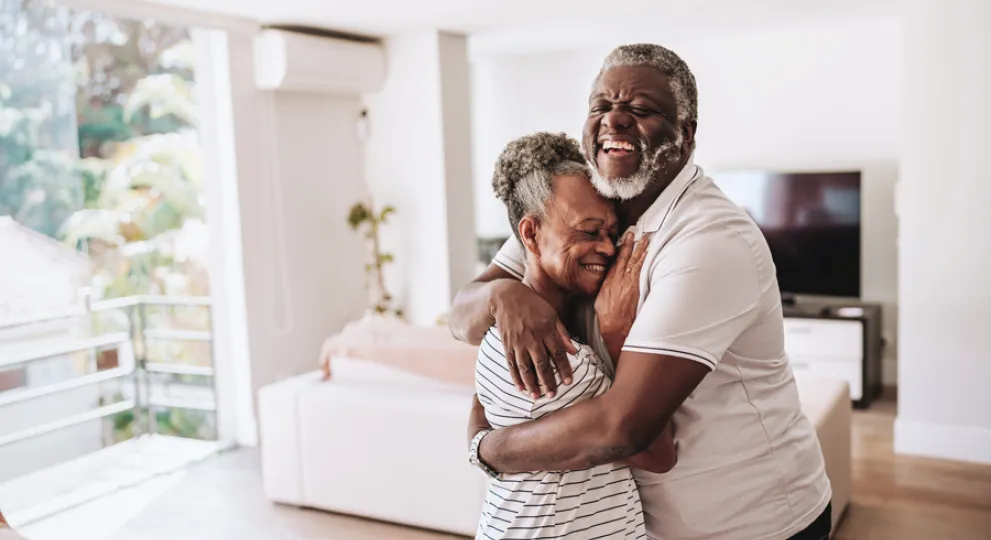Making Space for Gratitude
Making Space for Gratitude

It might seem strange, but gratitude can be a tool that may help you cope with the challenges of living with cancer.
When you think about all the benefits of gratitude, it’s like the Swiss Army knife of emotions. Even watching someone else’s act of gratitude can have a positive impact. Gratitude has been connected to positive benefits for:
- Cardiovascular health (which refers to the health of the heart and blood vessels)
- Inflammation (which is the body's response to illness or injury)
- Depression
- Anxiety
- Stress
- Sleep
- Blood pressure
- Patience
If you’re living with cancer, gratitude may help you deal with physical symptoms and feel emotionally supported. It may help you feel less distressed and even be more likely to take your medication.
Of course, even the idea of gratitude might seem far-fetched when you’re living with cancer. You might understandably wonder what you have to be grateful about.
But gratitude doesn’t mean you should pretend the cancer isn’t there. Instead, it may mean accepting your very real challenges while still being open to good things on your journey.
Some people living with cancer report that being grateful has made their lives better, helping them to:
- Have closer relationships with family members and friends
- Think about and focus on their priorities
- Take control of a personal health situation
- Experience spiritual and personal growth
- Set and achieve new goals
- Have more flexibility, patience, and resilience
Here are some small, actionable steps called Microsteps that you may wish to take to help you with feeling grateful. As always, consult with your care team for the guidance on gratitude practices that are best for you.
Writing it down before you lay down.
Keeping a gratitude journal is a way to log the good things in your life, however big or small. Try jotting down three things you’re grateful for at the end of each day. Physically writing can help you slow your thinking, allowing you to reflect. It also helps you create a record you can return to later.
Appreciating the details.
With gratitude, we often focus on big moments and milestones. As you reflect on what you’re grateful for, try instead to put your attention on the little things.
To get you thinking, you can ask yourself questions, such as:
- What went well today?
- What’s one recent thing that went better than I expected?
- What’s one good thing I’ve taken for granted?
- What good food did I get to eat this week?
- What do I like about the place where I live?
- Who is one person who recently made me laugh?
- What’s one thing I’m looking forward to?
Being grateful for meals.
Before sitting down to eat, try thinking of a few things you’re grateful for – including what you’re about to eat. Mindful eating can help the body go into – and stay in – its relaxed mode, and this can help with digesting food.
Keeping a gratitude jar.
Try keeping a jar where you collect notes of things you are thankful for. Over time, watching the jar fill up can be a visual reminder of the positive aspects of your life.
Taking a gratitude walk.
Going for a walk can be a great way to give yourself time and space to reflect on what you’re grateful for, especially If you’re able to go outside and experience nature. Whether it’s the sound of birds, the feel of the breeze, or the sight of flowers, acknowledging these can foster a sense of gratitude. You’ll get the benefits of walking, too!
Choosing a gratitude mantra or affirmation.
Words can help us feel resilient and shift our thought process. Try choosing a mantra that makes you feel grateful and speak it aloud or say it to yourself in a moment of stress. It could be one you make up, or a favorite quote.
For instance, this one, from Maya Angelou: “This is a wonderful day. I have never seen this one before.”
Taking a gratitude pause.
The next time you say “thanks” to someone, take a moment to pause and think about why you’re thankful for what they did.
Creating a visual gratitude cue.
Write a few things you’re grateful for on a note or piece of paper and leave them around. This could be in your home, in your car, at your workspace, or any other place where you’re likely to see them. These visual reminders can act as daily reminders to help you to feel gratitude during your day.
Thinking about your challenges.
Practicing gratitude doesn’t mean pretending that everything is going perfectly or denying the reality of living with cancer. Facing the challenges on your cancer journey may help you feel grateful for how far you’ve come and put focus on what you’re looking forward to.
Expressing digital thanks.
Expressing gratitude doesn’t have to be done in-person. Consider emailing, texting, or using social media to thank someone for something they did for you or just that you appreciate their friendship and support. Finding the right words isn’t always easy, so if you need some inspiration, here are some examples to consider:
- "I just wanted to say thank you for always being there for me.”
- “Your support means the world."
- "I really appreciate everything you do for me.”
- “Thanks for being such an amazing friend.”
- "I couldn't do this without you!"
- "Your kindness never goes unnoticed.”
- "Just a quick note to say thanks for being you.”
- "I’m grateful to have you in my life.”
Developed with Thrive Global













